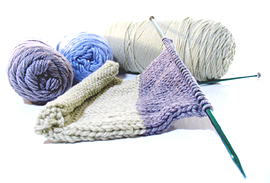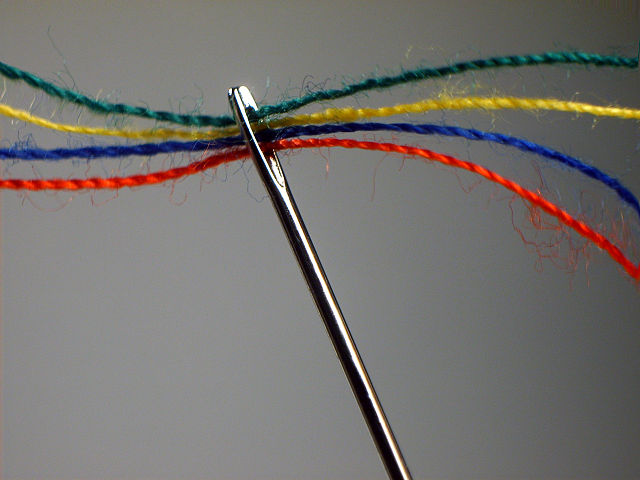 Do me a favor. Go to your favorite search engine and enter “vaccines.” Then click on “images.”
Do me a favor. Go to your favorite search engine and enter “vaccines.” Then click on “images.”
Go ahead. I’ll wait.
OMG HAVE YOU EVER SEEN SO MANY NEEDLES IN YOUR WHOLE LIFE!!!??!?!?!?
Want to slap your forehead? Now search for images of “childhood vaccination.” I’ll wait again.
You guessed it. More needles. Doctors with needles. Children looking at needles about to go into their arms. Children with concerned faces (usually), although sometimes the child and the Mom (it’s always Mom) and the doctor are all smiling gaily. As the needles comes closer.
Yup, it’s a thing. If an article about vaccines is illustrated at all, it’ll be illustrated with a photo of a syringe with a big old needle.
As you probably know, we have a problem in this country with science denial, and one of the more vexatious examples is that many parents refuse to have their children vaccinated because they reject the overwhelming evidence that childhood vaccines are safe.
Public health researchers and science communication experts have been trying to figure out how to assuage such parents’ concerns. A 2013 study compared the following strategies:
(1) information explaining the lack of evidence that MMR causes autism from the Centers for Disease Control and Prevention
(2) textual information about the dangers of  the diseases prevented by MMR from the Vaccine Information Statement
the diseases prevented by MMR from the Vaccine Information Statement
(3) images of children who have diseases prevented by the MMR vaccine
(4) a dramatic narrative about an infant who almost died of measles from a Centers for Disease Control and Prevention fact sheet; or to a control group.
What worked? Nothing. None of these interventions increased parents’ intent to vaccinate.
Just last week, however, another study was published with more heartening results. As reported by the UCLA press office, this study—conducted by psychologists from UCLA and the University of Illinois-Urbana-Champaign and published early on-line in the Proceedings of the National Academy of Sciences—found that attitudes became more favorable when people were presented with materials that described the dangers of vaccine-preventable diseases AND explained how vaccines prevent these diseases AND included pictures of children with the diseases AND included a Mom’s dramatic description of her baby boy’s life-threatening bout of measles.
 I’m not here to discuss why these two studies seemed to get different results (although there are enough differences in study design to provide some clues). I’m just here to say that the UCLA press release about the study was illustrated with—you guessed it—a photo of a doctor about to stick a needle in an adorable baby’s behind. (True confession—it was Josh Rosenau who noticed this. I’m just expressing the general official outrage. More true confessions—Seth Mnookin, whose book The Panic Virus tells how the myth that vaccines cause autism got started, tweeted on the topic back in February)
I’m not here to discuss why these two studies seemed to get different results (although there are enough differences in study design to provide some clues). I’m just here to say that the UCLA press release about the study was illustrated with—you guessed it—a photo of a doctor about to stick a needle in an adorable baby’s behind. (True confession—it was Josh Rosenau who noticed this. I’m just expressing the general official outrage. More true confessions—Seth Mnookin, whose book The Panic Virus tells how the myth that vaccines cause autism got started, tweeted on the topic back in February)
Anyway…if you go back and look at the news coverage of the earlier study, you’ll see the same thing. Over and over and over again. It’s enough to make you WANT TO PUT CAPS LOCK ON AND SCREAM:
WHAT ARE YOU THINKING????!!!???
Sorry.
Can we agree on one thing? Stories about childhood vaccination in general, and the safety and desirability of having your children vaccinated in particular, s hould not be illustrated with needles and syringes. It’s not that hard to think of other illustrations. For some stories, it might be appropriate to follow the lead of the researchers and show a child with measles. Or you could just go relentlessly positive. How about a bunch of kids running around a school playground? Maybe an adorable shot of a big brother holding his brand new little sister? Or a Mom (oh heck, go nuts, how about a Dad?!) walking out of a doctor’s office with a smiling child. I’d even go for a photo of a doctor sticking a “I got my vaccines today!” sticker on a cute little baby’s onesie.
hould not be illustrated with needles and syringes. It’s not that hard to think of other illustrations. For some stories, it might be appropriate to follow the lead of the researchers and show a child with measles. Or you could just go relentlessly positive. How about a bunch of kids running around a school playground? Maybe an adorable shot of a big brother holding his brand new little sister? Or a Mom (oh heck, go nuts, how about a Dad?!) walking out of a doctor’s office with a smiling child. I’d even go for a photo of a doctor sticking a “I got my vaccines today!” sticker on a cute little baby’s onesie.
Something. Anything.
But not needles.
OK?
Happy face photo credit: By Jgsho (Own work) via Wikimedia Commons

